Clinton speech soars - sometimes
- Published
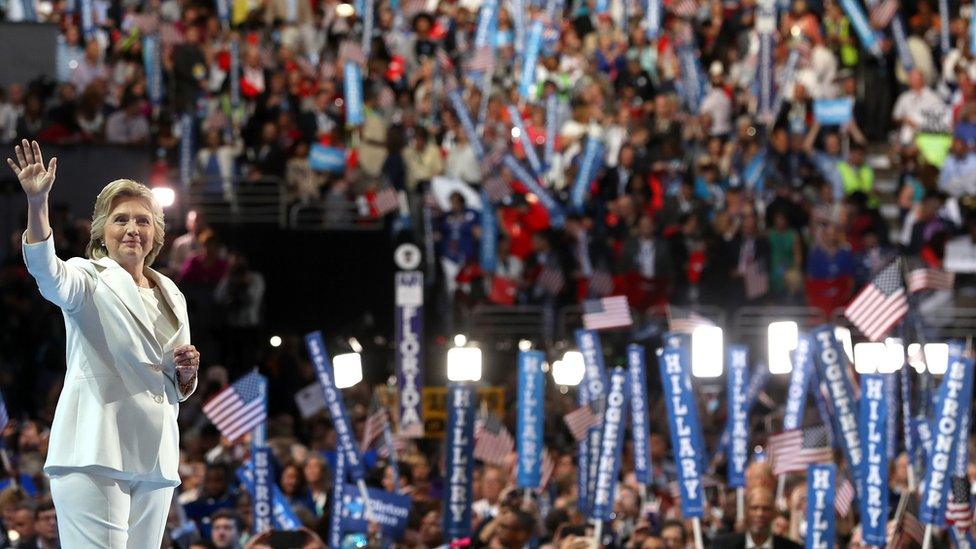
Hillary Clinton had a tall order on Thursday night.
She had to present herself to the nation as the newly crowned Democratic Party nominee. She had to address doubts some Americans have expressed about her character. And she had to follow up on a Wednesday night that was full of rhetorical all-stars - including Vice-President Joe Biden and, most notably, President Barack Obama.
Sometimes making the case for oneself is significantly harder than singing the praises of another.
Mrs Clinton, in an acceptance speech that occasionally soared and sometimes trudged along, did her best to frame the upcoming general election race in her favour.
Donald Trump had his shot last week in Cleveland. Now it was her turn.
And, like her Republican opponent, she did it by trying to paint herself as five different personas.

The leader
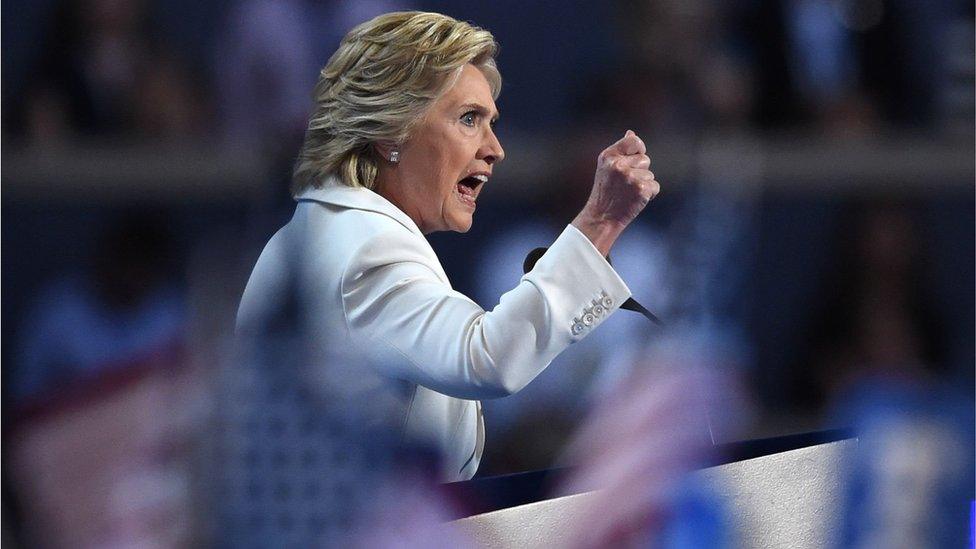
Many convention speakers emphasised Mrs Clinton's unflappable nature
Mrs Clinton's rhetoric was at its sharpest when she tried to draw contrasts between her leadership style and those of her opponent. If she's going to rally all Democrats - and some independents and Republicans - to her side in November, she'll have to make the case that Mr Trump isn't only an unlikely leader, he's a dangerous one.
"Ask yourself," Mrs Clinton said. "Does Donald Trump have the temperament to be commander-in-chief?"
Mrs Clinton listed what she saw as essential presidential leadership attributes - "smarts, judgement and cool resolve".
Prior to her speech on Thursday night, Mrs Clinton presented a parade of national security experts - led by retired Marine General John Allen - who said Mrs Clinton would stand by US allies and offer a stable foreign policy. Earlier this year, more than a hundred members of the foreign policy establishment signed a letter condemning Mr Trump's views.
Such endorsements likely don't matter much to the working-class Americans who have flocked to Mr Trump, but it may help sway the type of suburban white-collar voters who are often decisive in key states.
Key quote: "Imagine him in the Oval Office facing a real crisis. A man you can bait with a tweet is not a man we can trust with nuclear weapons."
Why it matters: The line puts Mr Trump in a no-win situation. Either forsake Twitter and seem to let the challenge go unanswered, or fire back and confirm Mrs Clinton's allegations.

The optimist
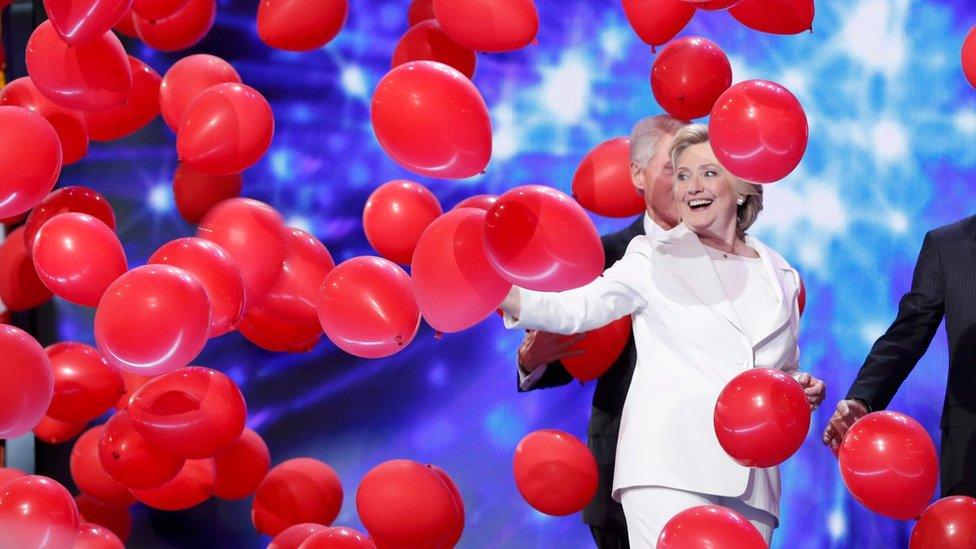
"Stronger together" has been an overarching theme of the campaign
The nation, Mrs Clinton said, "is at a moment of reckoning". Her speech painted Donald Trump as a divisive figure, seeking to turn Americans against ethnic and religious minorities.
She harkened to the days of the nation's founding - a proven rhetorical tactic that Mr Trump neglected in his acceptance speech last week. The US, she asserted, was founded on compromise and embraced "the enduring truth that we are stronger together" - wrapping her campaign slogan in revolutionary-era regalia.
Last week Mr Trump gave an acceptance speech that painted a dark picture of a nation going woefully astray. He would later say that Democrats during their convention this week were describing a healthy world that "does not exist".
Mrs Clinton countered by saying Mr Trump "wants to divide us - from the rest of the world, and from each other. He's betting that the perils of today's world will blind us to its unlimited promise".
She said the nation will rise up to its challenges and not be afraid - then went on to tick off some of Mr Trump's more controversial proposals, such as the US-Mexico border wall and rhetoric - since softened - directed against Muslim immigrants.
According to polls, a majority of Americans say the nation is heading in the wrong direction. Mr Trump attempted to capitalise on these concerns by casting himself as the truth-telling leader who can bring about change. Mrs Clinton, on the other hand, is trying to claim the optimistic high ground. Time will tell who has the appropriate strategy for the current times.
Key quote: "I will be a president for Democrats, Republicans and independents; for the struggling, the striving and the successful; for those who vote for me and those who don't; for all Americans."
Why it matters: It's the kind of line Barack Obama has used in the past - and for good reason. Americans like to be told that they're all in it together - even if many may secretly believe that it's not always true.

The progressive

Mr Sanders' successful campaign has pulled Mrs Clinton to the left
Although many Bernie Sanders supporters weren't cheering, Mrs Clinton's speech tilted heavily toward the progressive values they have championed for more than a year.
"Your cause is our cause," Mrs Clinton said to the Vermont senator's faithful. "Our country needs your ideas, energy and passion."
She put in a plug for the party platform - a rare event in a nomination acceptance speech - and said that she needed the help of Sanders loyalist to "make it happen together".
After noting that some Americans are struggling, she began a list of things she says she believes - including many progressive principles. Campaign finance reform, limiting executive bonuses, raising the minimum wage, addressing climate change, embracing "affordable healthcare", opposing "unfair trade deals" and supporting equal pay for women were all on the policy buffet table.
She would later talk about making college tuition free "for the middle class" - and once again name-checked Mr Sanders, with whom she said she would join forces to get it done.
Key quote: "I believe that our economy isn't working the way it should because our democracy isn't working the way it should."
Why it matters: The line is pure Bernie Sanders, sans the heavy Brooklyn accent. But will the Sanders faithful buy it?

The doer
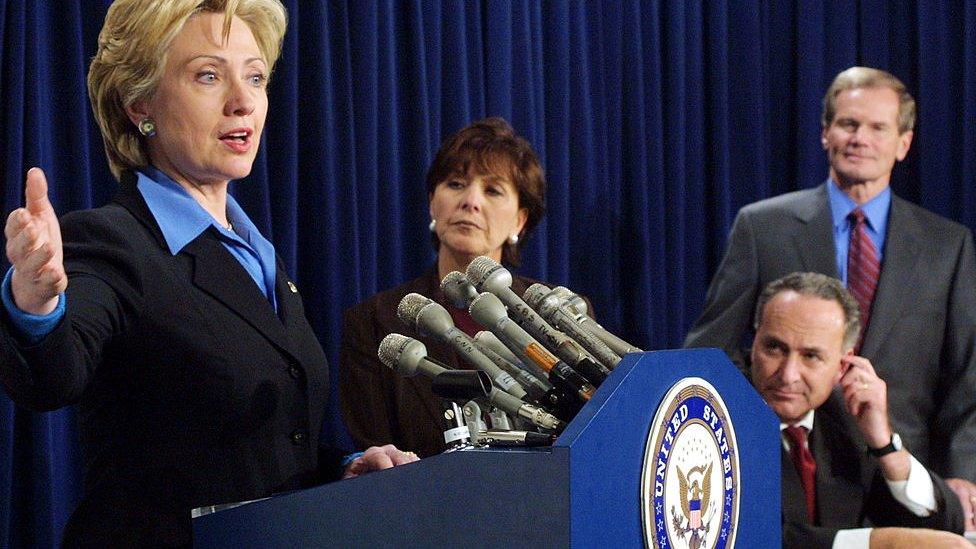
Mrs Clinton used her long CV as a selling point
One of Mrs Clinton's greatest challenges in her acceptance speech was how she would re-introduce herself to the American public after more than 20 years in a national political spotlight that has frequently left her singed.
"Sometimes the people at this podium are new to the national stage," Mrs Clinton said. "As you know, I'm not one of those people."
Many Americans on both the left and the right have embraced "change" candidates, whether it's Mr Trump and Mr Sanders, who have focused on the frustration many are feeling with US politics.
It was a sentiment Mrs Clinton could not leave unacknowledged.
"There's too much inequality," she said. "Too little social mobility. Too much paralysis in Washington. Too many threats at home and abroad."
Mrs Clinton made an effort, during her speech, to explain how her experience could be used to get things accomplished; how she was, in her husband Bill Clinton's words on Tuesday, "a change-maker".
She told the audience to look at her record of accomplishment.
"I've worked across the aisle to pass laws and treaties and to launch new programs that help millions of people," she said. "And if you give me the chance, that's what I'll do as president."
Key quote: "To drive real progress, you have to change both hearts and laws."
Why it's important: Eight years ago Barack Obama promised change, but his legacy of legislative accomplishments continues to be bitterly opposed by those on the right. If Mrs Clinton is elected, she will have to defend those accomplishments and cement their permanence. Changed hearts and laws are equally important in crafting a political legacy.

The ground-breaker
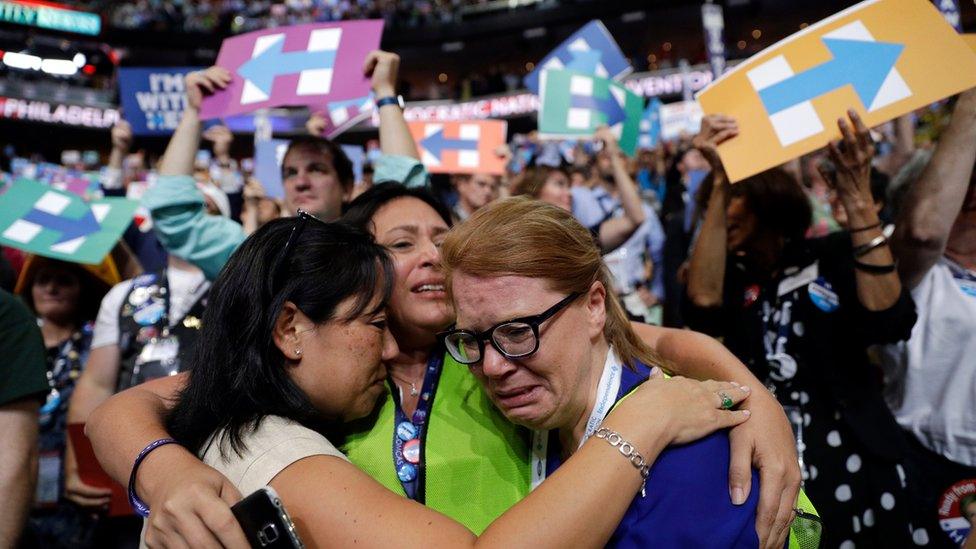
Mrs Clinton's nomination was an emotion moment for many women in the crowd
On Wednesday night, Mrs Clinton addressed the convention on a screen in which a collection of the photographs of the previous 43 presidents - all men - broke away like glass, revealing her standing in a room full of women.
She noted that the glass ceiling - which eight years ago had been cracked by her unsuccessful run for the Democratic nomination against Mr Obama - was now shattering.
On Thursday, about halfway through her presidential acceptance speech, Mrs Clinton acknowledged the historic nature of her nomination.
"Standing here as my mother's daughter, and my daughter's mother, I'm so happy this day has come," she said. "Happy for grandmothers and little girls and everyone in between."
She tried to expand the nature of her accomplishment into something that every American can share, however, including "boys and men".
"When any barrier falls in America, for anyone, it clears the way for everyone," she continued. "When there are no ceilings, the sky's the limit."
Key quote: "Tonight, we've reached a milestone in our nation's march toward a more perfect union - the first time that a major party has nominated a woman for president."
Why it matters: Say what you will about Mrs Clinton - and her opponents on both the left and the right have said plenty, and will say plenty more - but the significance of her accomplishment is undeniable.
